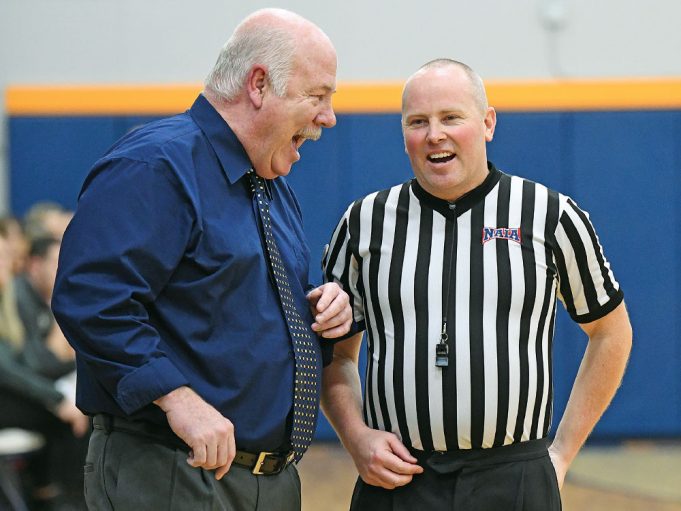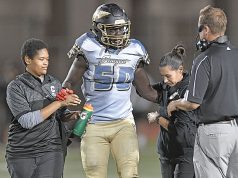Not all arguments with coaches end perfectly. The goal of all officials is to resolve volatile conflict quickly and to an extent that allows the contest to continue with as little interruption as possible.
Your demeanor, body language, what you say and how you say it are all critical components in successfully ending arguments.
A phrase that will end most arguments regarding judgment calls is, “Coach, if it happened the way you say it did, I got it wrong.” It works because you’re not admitting a mistake, putting up a defense or ignoring the coach completely. Only a coach who wants to argue for the fun of it or is trying to intimidate an official will continue an argument after hearing that phrase. Any coach with those motives deserves to be ignored.
That statement also works when the dispute involves a rule. If the coach doesn’t volunteer his or her take on how the rule is interpreted, the official can ask for it. By eliciting information from the coach, the official turns the argument around and becomes the questioner, the person who actually controls the argument. Once the coach has offered his or her interpretation, the official can tell the coach that if that interpretation is correct, an error was made.
Sometimes resolving an argument has to wait or you may want to delay a discussion with the coach. A typical situation that can escalate into an argument is when a coach has a question that doesn’t get answered. Try not to ignore a question; a coach will only get angrier if he or she feels ignored. If play is continuing and doesn’t allow for a protracted conversation, you can say, “I’ll get back with you, coach.” But then be sure to follow up at first opportunity.
Doing everything right doesn’t mean you’re going to eliminate all arguments. Sometimes we need to understand a coach just wants to vent. That’s OK … within reason.
Consider the phrase, “I’ve heard enough.” Ever use it on the field or court? Sure, we all have.
Nine times out of 10, when you say, “I’ve heard enough,” your message will be clear to the recipient, but that example underscores the need to be very conscious of your language during a game. There are hundreds of other situations that arise during games when you have the opportunity to say something to coaches. You have to know how to manage your responses so that you do not make matters worse. And that means always choosing your words carefully.
Using barked-out orders like “Shut up!” “Sit down!” and “Back off!” are antagonistic and likely won’t do much to help you manage the game, much less your reputation. Change directives to requests whenever possible and avoid issuing threats.
Instead of ordering players or coaches to stop complaining (“Be quiet! Not another word out of you!”) or threatening them (“Stop complaining or you’ll be sorry!”), you can accomplish the goal more gently, yet just as effectively, by making a request: “Would you please stop making those comments? They are inappropriate.”
Ultimatums, too, will only get you into trouble. All “if-then” statements should be avoided. For example, a coach is continuously ranting at you from the sidelines. Fed up, you finally walk over and say, “Coach if you say one more word — just one more word! — I will throw you out of this game.” No problem if the coach doesn’t say anything in response. But what if the coach says, “You’re right; I’m sorry.” Uh oh. He or she apologized but in doing so said not just one word, but four.
You now have one of two choices that the coach has determined for you — accept the apology and not follow through with your threat or give him or her the thumb even though you got an apology. Either way you lose.
When coaches blow up and things start to get heated, you must be at your most vigilant with your words. It takes a lot of practice to listen to an irrational person and then respond rationally. Make sure your responses are deliberate and well thought out.
What's Your Call? Leave a Comment:
Note: This article is archival in nature. Rules, interpretations, mechanics, philosophies and other information may or may not be correct for the current year.
This article is the copyright of ©Referee Enterprises, Inc., and may not be republished in whole or in part online, in print or in any capacity without expressed written permission from Referee. The article is made available for educational use by individuals.
















